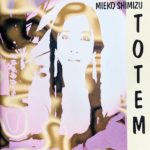
Totem proves there’s more than one genius behind the Shimizu family tree. Rightfully, it gives you a peek into the deeply brilliant leftfield ideas of Mieko Shimizu, joining brother Yasuaki Shimizu as another unique branch from that musical lineage. Finding herself in the UK, in 1988, Mieko signed with Chris Cutler’s (of Henry Cow), of the infamous Rock In Opposition label, Recommended Records RēR Megacorp, and released something that pointed at a futuristic form of Japanese Pop her brother had helped pioneer and later hone with her. Entirely self-penned and performed, Totem presents her own ideas in full flight.
Here I grant myself freedom to repeat myself: Mieko had roots in Japanese Art Pop, collaborating with brother Yasuaki Shimizu (of little known band Mariah…) on his own records, writing for others like Mami Koyama, and translating that gift into her own solo works from the late ‘80s. Keyboardist, singer, and elite sound designer, by this period in time, Mieko’s own stellar solo career had been sidelined due to lack of interest by the Japanese music market and she found herself working mostly as a session musician and CM writer.

It was Mieko that coaxed Yasuaki to Europe and further along his career there. Mieko had already laid roots, spending more time in the UK, while periodically visiting Japan. Mieko’s first attempts to break into the Japanese music market had been inspirational. On Mami Koyama’s “Misty Moon” you could hear experimental pop leanings Mieko gravitated to. A love of jazz and world music had informed her move away from quite learned, classical piano technique and pushed her to explore sample and synthesizer based music. Unable to find the control and opportunity needed to grow her own career in Japan, off to England she left to pursue more behind the scenes, musical options.
Invited by her brother Yasuaki to London’s Wolf Studios, he hoped Mieko would help bring some semblance of song craft to a bunch of ethnic-driven musical sketches he’d been demoing/throwing around. Working with David Cunningham, Manny Elias (drummer for Tears for Fears), and Pandit Dinesh (gifted Indian percussionist), it was Mieko who deeply assisted (with lyrics, vocals, and keys) to give shape to that kaleidoscopic vision of ethno-pop. In Dementos, I’d argue, you hear as much of Mieko as the shade of work you’d hear in Totem. I’d argue, it’s Mieko’s gift at making avant dance music, that allowed Yasuaki to create this stellar gem in his catalog.
What was Totem then? I’d argue it’s others recognizing the gifts Mieko had and actually letting her “do you”. Recorded in the same studios and around the same time frame as Dementos, Totem was Mieko going deep into herself to fully explore what her voice and music was. Initially, I heard the influence of forward-thinking avant pop artists like Kate Bush and Laurie Anderson, then it gravitated to: I think she’s expanding on the technical influences heard in urban dance music or “world music” and trying to fit them in this other music she had a hand in: Japanese technopop, much like Yasuaki.
“Night-Owl” kicks off the album with some cloud busting thunder. Entirely sung in Japanese, like the rest of the album, the opener uses heavy beats to create a snakey three minute swing of darkening dance Pop. Hints of Eastern traditional singing burrow through the thick, atmospheric Pop songs that build and contract within themselves throughout the early half of the album. “Amayadori”, clearly shows its lineage from electro and industrial genres. “Tobira Ga Akanai” takes Afro-Pop through a technophilic joy ride that reminds me less of anything from that era and more of contemporary cut-up Pop heard in Korea (or found through YouTube shares).

Every track is its own star here but every thing has its own way of highlighting the gifted musical vision Mieko was reaching for. A masterpiece of cut-up music, every carved out figure here positively brims with powerful movement. “Ichimen Ni Tulip” ends the album the same way it started, beats pounding out heartfelt mantras that never let up. Although this was Mieko’s debut, you shouldn’t be surprised to learn that she’s still doing many things special we can all support.
